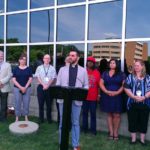What a humbling but appropriate way to start the New Year, with a public apology for losing patience with someone. The apologizer, Pope Francis, expressed contrition New Year’s Day regarding an incident the night before when he slapped the hand of a woman who would not let go of his as he greeted an audience in St. Peter’s Square.
Video of his angry reaction went viral on social media, with his attractors and detractors weighing in on what happened. He apologized publicly during the mid-day Angelus prayer in St. Peter’s Square on Jan. 1.
The incident underscores the challenges that cause fallible human beings, including the pope, to stumble on the journey to peace, a journey he describes in his letter for World Day of Peace, observed Jan. 1. His willingness to own up to his failing sets an example on how to move forward: with humility, patience and commitment. You can read his letter “Peace as a journey of hope: dialogue, reconciliation and ecological conversion” in this week’s paper. This editorial highlights some of the points with an accompanying call to action.
• “Peace and international stability are incompatible with attempts to build upon the fear of mutual destruction or the threat of total annihilation.” The escalating tensions between the U.S. and Iran come to mind. Email, write and call Congress and the Trump administration to engage in dialogue with Iran’s leaders. Urge our government to end crippling sanctions against Iran and to re-enter the 2015 nuclear agreement. (Go to govtrack.us for information and resources.) Call on Congress and President Trump to extend the New START Treaty, which is set to expire in February 2021, leaving our world at risk for a nuclear catastrophe.
• Pursue “a genuine fraternity based on our common origin from God and exercised in dialogue and mutual trust.” Beginning in our own homes, schools, parishes, town square and in the media, let us enter dialogue that seeks truth beyond ideologies and differing opinions. The pope says, “Listening to one another can lead to mutual understanding and esteem, and even to seeing in an enemy the face of a brother or sister.” Advice from Father Thomas Merton decades ago remains timeless: be interested in the truth, more so than the need to be right.
• Enable “memory, as the fruit of experience, to serve as the basis and inspiration for present and future decisions to promote peace.” Pope Francis referred to his recent visit to Hiroshima and Nagasaki in Japan, where tens of thousands of people died after our country dropped atomic bombs in the first and only use of nuclear weapons in war. We remember not only to prevent the same errors from occurring again, the pope said, but also to recall small gestures of solidarity that can lead to courageous and even heroic decisions.
• The peace process requires enduring commitment. The Holy Father calls us to “protect the rights of every person, especially the weak and the marginalized …” For starters, insist that our U.S. senators and representatives sacrifice self-interest by voting in favor of just, fair and compassionate immigration law. Contact Congress at govtrack.us and the U.S. Conference of Catholic Bishops’ Justice for Immigrants website (justiceforimmigrants.org) for information on proposed bills and action alerts.
• Renounce a desire to dominate others and learn to see one another as persons, sons and daughters of God, brothers and sisters. The pope advises us to value people “for the promise that they embody.” When we choose the path of respect, “we break the spiral of vengeance and set out on a journey of hope.”
• Choose the path of reconciliation. “When we learn to live in forgiveness, we grow in our capacity to become men and women of peace.”
• Support a more just economic system, which allows all to thrive and creates a greater sense of unity.
• Embrace ecological conversion, which will “lead us to a new way of looking at life, as we consider the generosity of the Creator who has given us the earth and called us to share it in joy and moderation,” Pope Francis said.
All of these observations and calls to action are rooted in prayer, which moves us to become more aware of the needs of others and how their needs reflect our shared humanity. Perhaps, we might also see our own need for a dose of humility.
Barb Arland-Fye, Editor
arland-fye@davenportdiocese.org











